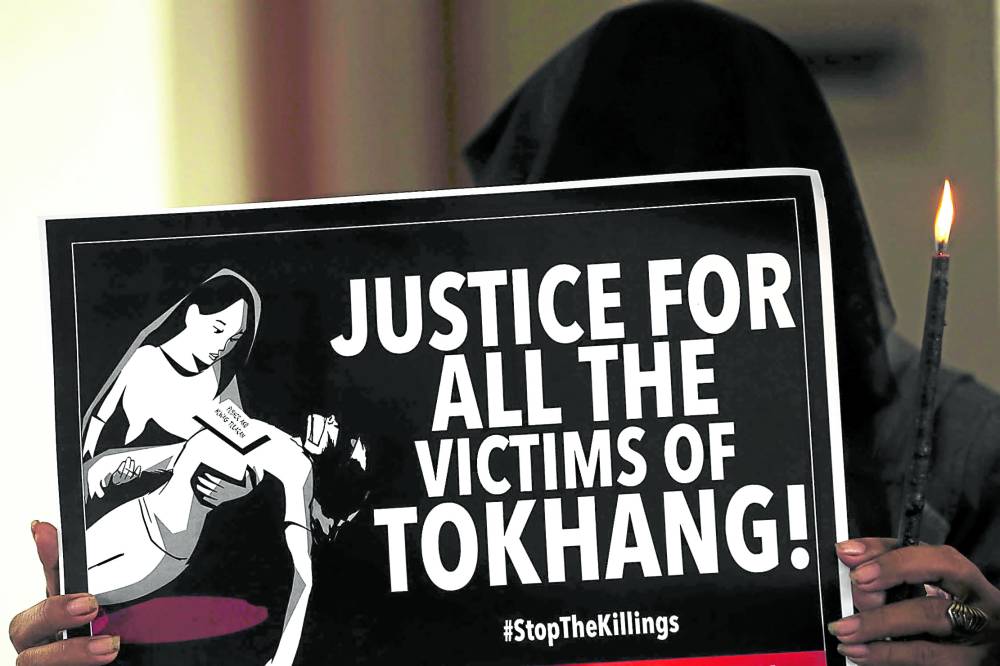
DRUG WAR Relatives of victims of extrajudicial killings under former President Rodrigo Duterte’s drug war gather at St. Joseph Parish in Bagong Silang, Caloocan City, on Jan. 27, 2018, to denounce the revival of the government anti-drug drive “Oplan Tokhang.” —NIÑO JESUS ORBETA
MANILA, Philippines — A survivor of Oplan Tokhang, the anti-drug drive of the Duterte administration, on Tuesday asked the Supreme Court (SC) to reopen the criminal case he filed against police officers for a 2016 anti-drug operation that left his companions dead and almost killed him.
Efren Morillo, who survived the August 2016 police operations after pretending to be dead and crawling out of the house to the highway, asked the SC to reverse the findings of the Ombudsman that dismissed the complaint for murder, frustrated murder, and robbery in relation to the chain of custody rule under the Comprehensive Dangerous Drugs Act against Police Captain Emil Garcia, Police Staff Sergeant Allan Formilleza, Patrolman James Aggarao Jr., and Melchor Navisaga.
Morillo’s co-petitioners are Maria Belen Daan, Lydia Gabo, and Marilyn Malimban. They are the relatives of the victims who died in the August 2016 police raid.
The Ombudsman acknowledged that the police officers admitted shooting to death Morillo and his companions as an act of self-defense.
“There is no question that Marcelo, Jessie, Anthony, and Rhaffy died, and Efren (Morillo) sustained a gunshot wound following the anti-illegal drug operation conducted by the respondents … In any case, acting in the fulfillment of duty or in the lawful exercise of a right or office — as what respondents did during the legitimate police operation,” read the Ombudsman’s ruling.
But petitioners told the SC that the Ombudsman no longer required the police officers to provide evidence that they were acting in self-defense during the anti-drug operation.
Quoting an SC ruling, petitioners, through their counsel from CenterLaw, said “If the accused admits the killing, the burden of evidence is shifted on him to prove with clear and convincing evidence the essential elements of the justifying circumstance.”
In this case, petitioners told the SC that the Ombudsman could not cite the evidence provided by the police officers that they were acting in self-defense.
The police said Morillo and his companion were armed, adding that Morillo even shouted: “Hindi kami pahuhuli ng buhay” (You will never get us alive).
However, Morillo yielded a negative for the presence of nitrate powder.
The Quezon City Metropolitan Trial Court also dismissed the direct assault case against Morillo, which was filed by the police officers.
In dismissing the complaint, the lower court said the prosecution failed to show that the police complied with the rules of the Philippine National Police in conducting the “tokhang” operations.
READ: Court acquits tokhang survivor of attacking policemen
“The Ombudsman, despite the plethora of evidence submitted by the petitioners, still found lack of probable cause to indict the respondents. This brazen and blatant error is tantamount to grave abuse of discretion amounting to lack or excess of jurisdiction,” read the petition.
The petition further stated, “the Ombudsman also failed to accord due respect for the findings of facts and judgments in intimately related previous court cases.”
“This case illustrates a clear example of the State’s unwillingness or inability to genuinely conduct an investigation or prosecution for crimes committed in the campaign against illegal drugs,” petitioners said.
“Now, the Office of the Ombudsman is effectively barring the prosecution of the respondents without valid reason and upon biased consideration of the evidence,” it added.